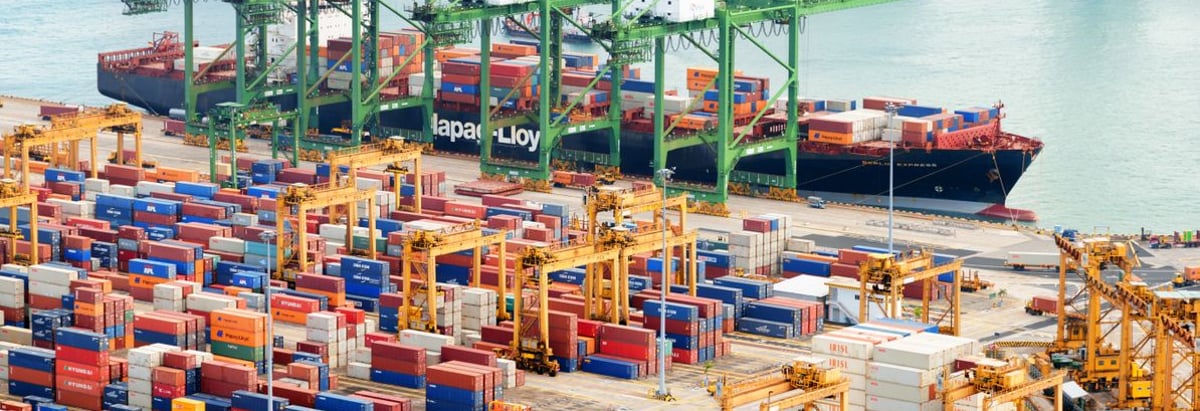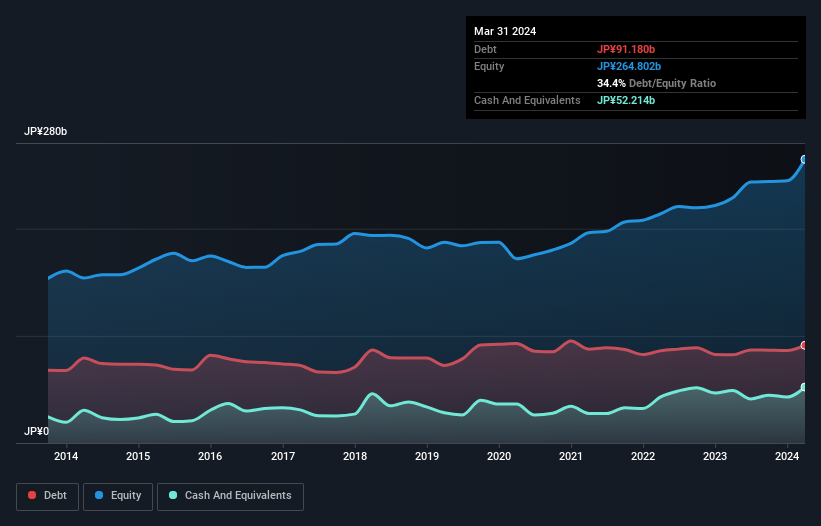
The external fund manager backed by Berkshire Hathaway's Charlie Munger, Li Lu, makes no bones about it when he says 'The biggest investment risk is not the volatility of prices, but whether you will suffer a permanent loss of capital.' So it seems the smart money knows that debt - which is usually involved in bankruptcies - is a very important factor, when you assess how risky a company is. Importantly, The Sumitomo Warehouse Co., Ltd. (TSE:9303) does carry debt. But the real question is whether this debt is making the company risky.
Why Does Debt Bring Risk?
Debt is a tool to help businesses grow, but if a business is incapable of paying off its lenders, then it exists at their mercy. In the worst case scenario, a company can go bankrupt if it cannot pay its creditors. While that is not too common, we often do see indebted companies permanently diluting shareholders because lenders force them to raise capital at a distressed price. Of course, the upside of debt is that it often represents cheap capital, especially when it replaces dilution in a company with the ability to reinvest at high rates of return. When we examine debt levels, we first consider both cash and debt levels, together.
View our latest analysis for Sumitomo Warehouse
How Much Debt Does Sumitomo Warehouse Carry?
The image below, which you can click on for greater detail, shows that at March 2024 Sumitomo Warehouse had debt of JP¥91.2b, up from JP¥82.4b in one year. However, because it has a cash reserve of JP¥52.2b, its net debt is less, at about JP¥39.0b.

A Look At Sumitomo Warehouse's Liabilities
According to the last reported balance sheet, Sumitomo Warehouse had liabilities of JP¥40.0b due within 12 months, and liabilities of JP¥132.1b due beyond 12 months. Offsetting these obligations, it had cash of JP¥52.2b as well as receivables valued at JP¥20.5b due within 12 months. So its liabilities outweigh the sum of its cash and (near-term) receivables by JP¥99.4b.
Sumitomo Warehouse has a market capitalization of JP¥189.3b, so it could very likely raise cash to ameliorate its balance sheet, if the need arose. But we definitely want to keep our eyes open to indications that its debt is bringing too much risk.
In order to size up a company's debt relative to its earnings, we calculate its net debt divided by its earnings before interest, tax, depreciation, and amortization (EBITDA) and its earnings before interest and tax (EBIT) divided by its interest expense (its interest cover). The advantage of this approach is that we take into account both the absolute quantum of debt (with net debt to EBITDA) and the actual interest expenses associated with that debt (with its interest cover ratio).
Sumitomo Warehouse's net debt to EBITDA ratio of about 1.7 suggests only moderate use of debt. And its strong interest cover of 1k times, makes us even more comfortable. It is just as well that Sumitomo Warehouse's load is not too heavy, because its EBIT was down 49% over the last year. Falling earnings (if the trend continues) could eventually make even modest debt quite risky. When analysing debt levels, the balance sheet is the obvious place to start. But it is future earnings, more than anything, that will determine Sumitomo Warehouse's ability to maintain a healthy balance sheet going forward. So if you're focused on the future you can check out this free report showing analyst profit forecasts.
Finally, a company can only pay off debt with cold hard cash, not accounting profits. So the logical step is to look at the proportion of that EBIT that is matched by actual free cash flow. During the last three years, Sumitomo Warehouse produced sturdy free cash flow equating to 60% of its EBIT, about what we'd expect. This cold hard cash means it can reduce its debt when it wants to.
Our View
Neither Sumitomo Warehouse's ability to grow its EBIT nor its level of total liabilities gave us confidence in its ability to take on more debt. But the good news is it seems to be able to cover its interest expense with its EBIT with ease. It's also worth noting that Sumitomo Warehouse is in the Infrastructure industry, which is often considered to be quite defensive. Looking at all the angles mentioned above, it does seem to us that Sumitomo Warehouse is a somewhat risky investment as a result of its debt. That's not necessarily a bad thing, since leverage can boost returns on equity, but it is something to be aware of. The balance sheet is clearly the area to focus on when you are analysing debt. However, not all investment risk resides within the balance sheet - far from it. Case in point: We've spotted 2 warning signs for Sumitomo Warehouse you should be aware of.
If you're interested in investing in businesses that can grow profits without the burden of debt, then check out this free list of growing businesses that have net cash on the balance sheet.
New: Manage All Your Stock Portfolios in One Place
We've created the ultimate portfolio companion for stock investors, and it's free.
• Connect an unlimited number of Portfolios and see your total in one currency
• Be alerted to new Warning Signs or Risks via email or mobile
• Track the Fair Value of your stocks
Have feedback on this article? Concerned about the content? Get in touch with us directly. Alternatively, email editorial-team (at) simplywallst.com.
This article by Simply Wall St is general in nature. We provide commentary based on historical data and analyst forecasts only using an unbiased methodology and our articles are not intended to be financial advice. It does not constitute a recommendation to buy or sell any stock, and does not take account of your objectives, or your financial situation. We aim to bring you long-term focused analysis driven by fundamental data. Note that our analysis may not factor in the latest price-sensitive company announcements or qualitative material. Simply Wall St has no position in any stocks mentioned.
Have feedback on this article? Concerned about the content? Get in touch with us directly. Alternatively, email editorial-team@simplywallst.com
About TSE:9303
Sumitomo Warehouse
Provides integrated logistics services in Japan and internationally.
Excellent balance sheet with proven track record and pays a dividend.
Market Insights
Community Narratives




